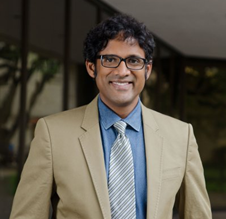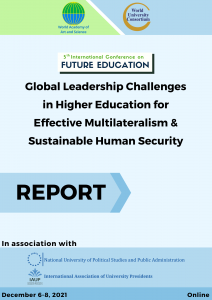
Dr. Rajagopal Raghunathan is the author of one the world’s most popular online courses, a MOOC offered by Coursera entitled ‘A Life of Happiness and Fulfillment’. He is Professor of Marketing at the McCombs School of Business at the University of Texas. WUC interviewed him in the midst of his world tour sharing his experiences on how to develop and deliver successful educational content online.
1. What are the major limitations of the current education system in preparing youth for life in the 21st century?
Education systems vary by country and culture of course—e.g., the system in Germany, Netherlands and some other European countries allow for students to self select into “professional” vs. “skilled labor” tracks during high school. However, by and large, most education systems fail us by not providing an overarching framework for understanding why being educated is useful. I would imagine that most people would agree that education is useful because it helps enhance everyone’s well-being, and I think this overarching goal needs to be made explicit from Day 1 and reaffirmed through out one’s education. Courses on the topic of "well-being” need to find a way into the curriculum and should play a very central role.
2. Is it possible to shift from a subject centered to person/student centered learning?
Yes, we currently have the technology to be able to do so. Online platforms can more easily enable students to delve deeper into a particular topic of interest.
3. What are the strategies to shift from passive to active learning?
Students differ from one another in how they learn. Some students learn well by listening, others by reading, and most learn best by actually doing—or teaching to someone else. The online medium provides greater opportunities for active learning. For example, students could be asked to videotape the various things that they did for an assignment and upload it on to the course website. Or, they could be asked to teach a particular topic to someone who is not knowledgeable about that topic. And, of course, they could be periodically tested through “in video quizzes”; findings show that such quick tests can enhance learner-engagement and learning.
4. What are the advantages of the online classes? What are your suggestions for creating an effective course?
The online medium offers several significant advantages over the offline (face-to-face) medium. One such advantage is efficiency. You can convey more information per unit of time and add other elements like images and music that enhance learning. It’s easier to integrate quick assessments in online contexts. You can bring in guest speakers and subject matter experts more easily in online videos. It’s more expensive and effortful to do it in face-to-face contexts.
That said, there are some key disadvantages of the online medium. It can be frustrating if the internet connection is bad. It also does not as easily allow for exchanges between learners. I think it is very important to have a few face-to-face meetings to complement the online content.
The key element that will make an online course a success is that it needs to offer information in smaller bits than is typically done face-to-face. Given that the online medium has more reach and therefore attracts students from a more diverse set of backgrounds, the message needs to be communicated differently—more directly and using simpler language.
 The enormous challenges in education today can only be solved by including system wide action at the institutional, local, national, regional and global level. A new paradigm is needed founded on an inclusive global perspective. This conference will examine the challenges in higher education today, and identify catalytic strategies capable of addressing global problems, supporting implementation of the UN SDGs and Human Security for all.
The enormous challenges in education today can only be solved by including system wide action at the institutional, local, national, regional and global level. A new paradigm is needed founded on an inclusive global perspective. This conference will examine the challenges in higher education today, and identify catalytic strategies capable of addressing global problems, supporting implementation of the UN SDGs and Human Security for all.